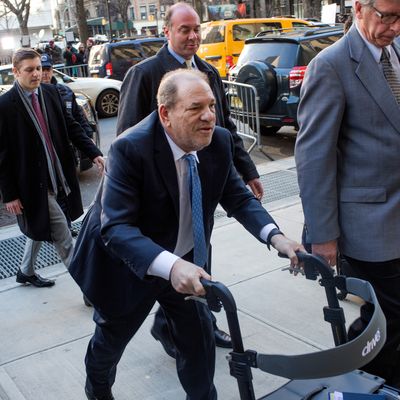
On March 11, 2020, Harvey Weinstein was sentenced to 23 years in New York state prison for rape and sexual assault. A Manhattan jury had found Weinstein guilty of criminal sexual act in the first degree and rape in the third degree on February 24, after a nearly seven-week trial. Justice James Burke, who presided over Weinstein’s case, remarked at his sentencing, “I will say that although this is a first conviction, it is not a first offense.” Burke also ruled that Weinstein must register as a sex offender. In the year since Weinstein’s sentencing, there have been a lot of developments in this case and other proceedings against him. The COVID-19 pandemic, of which New York was a global epicenter last spring, has impacted developments in some of these proceedings. Here’s a look at what has happened.
Weinstein has been locked up for more than a year.
Right after the guilty verdict came down on February 24, Weinstein was taken into custody. It was chaotic almost immediately. Around 4:30 that day, a source saw Weinstein being driven away from the downtown Manhattan courthouse in an ambulance. By that evening, Weinstein was taken to Bellevue Hospital for heart palpitations, chest pain, and high blood pressure. On March 4, he received a heart stent — a device that keeps coronary arteries open — and was taken to Rikers Island a day later, a source told Vulture at the time. Weinstein was eventually transferred to Wende Correctional Facility, a maximum-security state prison near Buffalo, on March 18.
Weinstein got coronavirus.
Several days after Weinstein’s arrival at Wende, reports emerged that he had COVID-19. Info surrounding Weinstein’s diagnosis was hard to pin down at the time. One of his lawyers said that Weinstein was placed in isolation when he got to Wende as a precaution because of COVID-19 concerns at Rikers. But his team didn’t give a direct answer about the diagnosis. The New York State Department of Corrections and Community Supervision said it “cannot comment on an individual’s medical record,” but confirmed that two Wende inmates did have the virus.
A court document quietly filed in October provided new intel on Weinstein’s diagnosis. In arguing that Weinstein should be out on bail pending appeal, his lawyers said that in March, “Weinstein tested positive for COVID-19 and was quarantined while in prison for 23 days.” In November, TMZ reported that Weinstein was extremely sick and a suspected COVID-19 case. Weinstein tested negative several days after that report.
Weinstein’s Los Angeles case got way more serious.
The Los Angeles district attorney’s office announced sex-crime charges against Weinstein on January 6, 2020 — one day before his Manhattan trial kicked off. L.A. prosecutors accused him of raping one woman and sexually assaulting another woman in separate incidents over two days in 2013. They charged him with “one felony count each of forcible rape, forcible oral copulation, sexual penetration by use of force, and sexual battery by restraint.” In April, L.A. prosecutors hit Weinstein with another count for allegedly attacking a woman at a Beverly Hills hotel in May 2010. “We are continuing to build and strengthen our case,” said former district attorney Jackie Lacey in announcing the new sexual battery by restraint count.
In October, L.A. prosecutors announced that Weinstein was charged with six more counts — three felony counts each of forcible rape and forcible oral copulation. They involve an incident that took place sometime between September 2004 and September 2005, where Weinstein allegedly raped a woman at a Beverly Hills hotel. The latest counts also involve an incident where Weinstein allegedly raped another woman “on two separate occasions in November 2009 and November 2010 at a hotel in Beverly Hills,” prosecutors said.
Weinstein will be extradited to Los Angeles. Eventually.
Several hours after Weinstein was sentenced on March 11, California prosecutors announced: “The Los Angeles County district attorney’s office has begun the process of extraditing defendant Weinstein to California to face the sexual assault charges that were filed in January.” On March 23, they provided an update, saying the office “initiated its request to New York for the temporary custody of defendant Weinstein … to bring him to Los Angeles County to face rape and sexual assault charges.” When they said this, COVID-19 had yet to fully bring New York City and State to a standstill. So at the time, it seemed like Weinstein could possibly be extradited sooner than later. They also said in their late-March statement: “As for any concerns given the coronavirus pandemic, our office expects that each agency responsible for processing, transporting, and housing defendant Weinstein will follow its protocols and public-health guidelines.” The pandemic did wind up delaying Weinstein’s extradition: He’s still at Wende right now. In December, his legal team and prosecutors agreed to delay his extradition hearing until April amid the continuing public-health crisis.
Weinstein is appealing his conviction.
His legal team filed a “notice of appeal” on April 2, 2020. This is basically an official notice that Weinstein’s lawyers will file detailed arguments appealing his conviction. While his attorneys have not yet filed the more extensive paperwork, their statement and prior legal papers give some hints on how they’ll appeal. They’re likely going to bring up how the judge denied their request to move his trial outside of New York City, after they had complained that media coverage would prevent him from an impartial jury and fair trial.
They might also revisit their complaints that Burke allowed to serve on the jury a woman who had authored a novel that involved predatory older men. They claimed that the fact she didn’t disclose this novel on a jury-selection questionnaire was problematic. (The questionnaire didn’t straight up ask about writing novels, but does ask if there’s anything a prospective juror should disclose that wasn’t covered in the questions.) His lawyers have also maintained that there was evidence at trial of continuing consensual relationships between Weinstein and the two women he was convicted of assaulting, which they insist undermines their statements about nonconsensual sex.
Weinstein still faces civil litigation, but a lot of lawsuits seem to be winding down.
In January 2021, a Delaware bankruptcy judge green-lit a settlement of more than $17 million for dozens of women who accused Harvey Weinstein of sexual misconduct. Under the settlement agreement, these women would submit claims, and the amount they receive would depend upon the type of abuse allegation. This figure and settlement process remain controversial. The Weinstein Company sought bankruptcy protection in 2018; this settlement is being allocated under its liquidation plan. This liquidation plan, thus the settlement under it, would mean that eligible accusers can’t go forward with legal claims against Weinstein Company officers. That includes women who want to opt out of the deal.
If accusers wanted to pursue civil claims against Weinstein, they would only be entitled to 25 percent of whatever money might have been available to them under this deal, some attorneys opposing this agreement have said. The agreement also only applies to women who accused him of misconduct when he was at The Weinstein Company, between its founding in 2005 until its collapse three years ago. Accusers eligible for the settlement can appeal the plan. Some have said they’ll continue their lawsuits against him. Doug Wigdor and Kevin Mintzer, who have repped several Weinstein accusers in lawsuits, said, “We look forward to continuing to fight on behalf of survivors who seek to hold Harvey Weinstein and his corporate enablers accountable.”
More From This Series
- Harvey Weinstein Is Finally Getting Extradited to Los Angeles
- Harvey Weinstein Has Lost 4 Teeth in Prison
- Harvey Weinstein Appeals Rape and Sexual-Assault Conviction


